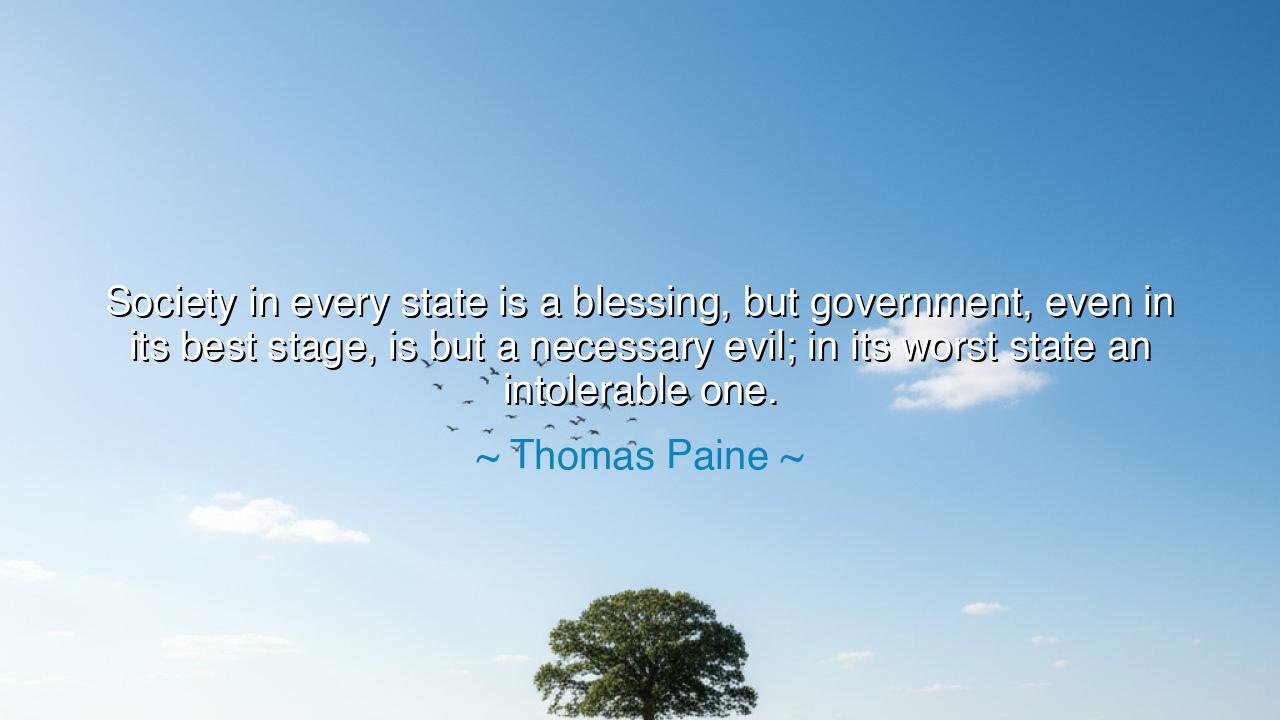
Society in every state is a blessing, but government, even in its
Society in every state is a blessing, but government, even in its best stage, is but a necessary evil; in its worst state an intolerable one.






"Society in every state is a blessing, but government, even in its best state, is but a necessary evil; in its worst state an intolerable one." — Thomas Paine
In these immortal words, Thomas Paine, the great voice of revolution and conscience, speaks the truth that has haunted humankind since the dawn of civilization. He saw with clear eyes that society and government are not the same — that one springs from love, and the other from fear. Society, he tells us, is born of our better angels: it is the fellowship of man with man, the web of kindness and need, of labor and affection. It arises naturally, like light from the sun. But government — ah, government! — it comes from our shadows, from the fear of injustice, from the corruption that slumbers in the heart of man. It is a necessary evil, and Paine laments that though it may protect us, it must first remind us of our own fallenness.
Paine’s insight came in an age of tyranny and awakening, when kings ruled by divine right and the cries of the common man were drowned in the clatter of crowns. He wrote during the American Revolution, when the colonies strained under the weight of British rule. He saw that the people of the New World did not hate society, nor the bonds that tie man to his neighbor — they hated oppression disguised as order. In his masterpiece, Common Sense, he sought to awaken the people to this truth: that government exists not to rule men, but to serve their mutual safety — and when it ceases to do so, it becomes the very evil it was created to restrain.
To understand his words is to grasp the eternal tension between freedom and authority. Society, like a family, thrives in warmth and cooperation; government, like a stern father, must restrain the unruly and punish the wicked. Yet what happens when the father forgets love and rules by fear alone? The blessing of order becomes the intolerable yoke of despotism. Paine warns that this transformation is swift and often unnoticed — the moment people grow complacent, the ruler’s hand grows heavier, and the spirit of liberty begins to fade. Thus, even the best government is one to be watched with wary eyes, for power, once granted, hungers for more.
Let us recall the story of the English Civil War, a century before Paine’s time. The people of England rose against King Charles I, weary of taxation without consent, weary of divine pretensions. They fought for liberty and justice, and when victory came, they rejoiced — only to find that their savior, Oliver Cromwell, had built a new tyranny in place of the old. The lesson, bitter and eternal, was this: that government, if unrestrained, becomes the master instead of the servant. Even those who begin with noble hearts are tempted by the taste of authority, and soon the necessary evil swells into an intolerable one.
Yet Paine was not a cynic. He did not despise government, nor preach anarchy, but sought to remind mankind that the true blessing lies in society, not in power. When people unite in mutual care, when they build communities on trust and compassion, the need for harsh government diminishes. A virtuous people require few chains; a corrupt people, many. Thus, the best government is that which governs least, for it rests upon a society strong in virtue, empathy, and self-restraint.
And so, Paine’s words are not only a political warning but a moral teaching. He tells us that if we wish to be free, we must first be good — for liberty without virtue is chaos, and government without conscience is tyranny. The blessing of society must grow from the seed of moral duty: to care for one another, to act justly, to live honorably. When the people live by conscience, government may slumber lightly; but when conscience fails, it awakens as a beast with iron teeth.
Therefore, O listener of the ages, remember this truth: government is a mirror of its people. If the heart of society is pure, the government remains small and humble. If the heart of society is corrupt, the government swells into a monster to contain its own creators. Freedom cannot exist without virtue, nor can peace endure without vigilance.
Lesson: The greatest strength of a nation lies not in the power of its government but in the virtue of its people. Society is the blessing, for it is built from love; government is the necessary evil, for it is born of fear.
Practical Action: Nurture the blessing before the evil must rise. Build communities grounded in compassion, justice, and truth. Take responsibility for your neighbor’s welfare, act with integrity in your dealings, and speak out against corruption — for every act of virtue lessens the need for rule. Be the good citizen whose conscience is his law, and thus help forge a society where government may shrink and liberty may flourish.






AAdministratorAdministrator
Welcome, honored guests. Please leave a comment, we will respond soon